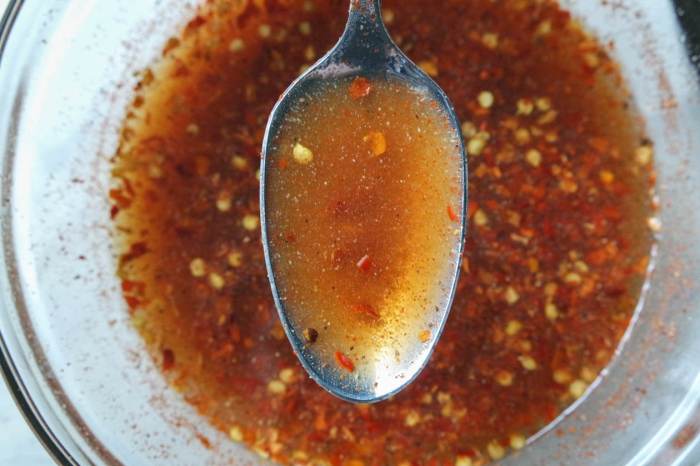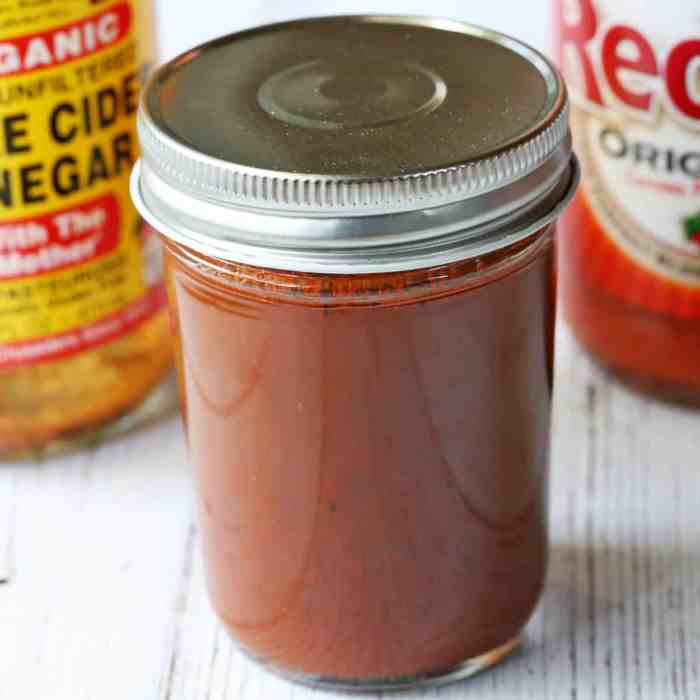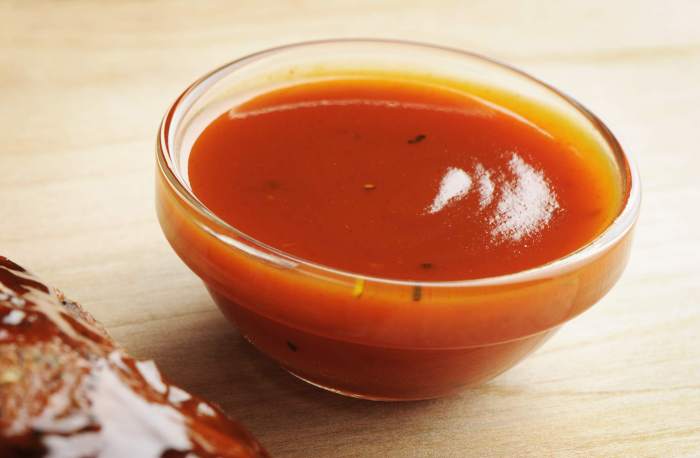Best Vinegar Based Barbecue Sauce Recipe
Vinegar-Based Barbecue Sauce: A Deep Dive
Best vinegar based barbecue sauce recipe – Vinegar-based barbecue sauces offer a unique and tangy counterpoint to the sweeter, tomato-based varieties prevalent in many parts of the United States. Their sharp acidity cuts through the richness of meats, creating a complex and refreshing flavor profile that has captivated barbecue enthusiasts for generations. This exploration delves into the history, ingredients, variations, and culinary applications of this distinctive sauce.
Introduction to Vinegar-Based Barbecue Sauce

Source: jesspryles.com
Vinegar-based barbecue sauces are characterized by their prominent sour notes derived from various vinegars, often balanced with sweetness from sugars and a complex blend of spices. Unlike tomato-based sauces, they typically lack the deep red color, instead exhibiting hues ranging from light amber to deep brown, depending on the vinegar and added ingredients. These sauces are known for their bright, clean flavor that complements a wide range of meats.
Historically, vinegar-based sauces emerged in the southeastern United States, particularly in the Carolinas, where readily available ingredients and a preference for tangy flavors shaped their development. Regional variations exist, with differences in the type of vinegar used (apple cider vinegar is common in the Carolinas, while white vinegar is more prevalent in other regions), the level of sweetness, and the spice profile.
The use of specific spices also varies regionally, reflecting local traditions and available ingredients.
Several types of vinegar contribute unique characteristics to barbecue sauces. Apple cider vinegar imparts a fruity sweetness and subtle tartness. White vinegar provides a sharp, clean acidity. Other vinegars, such as rice vinegar or even balsamic vinegar, can be incorporated for more nuanced flavor profiles.
Essential Ingredients and Their Roles

Source: healthyrecipesblogs.com
The foundation of any excellent vinegar-based barbecue sauce lies in the careful balance of its key components. Each ingredient plays a crucial role in shaping the final flavor and texture.
- Vinegar: Provides the essential tartness and acidity, cutting through the richness of the meat. The choice of vinegar significantly impacts the overall flavor profile.
- Sugar: Balances the acidity of the vinegar, adding sweetness and depth. Brown sugar, granulated sugar, or even honey can be used.
- Spices: Contribute complexity and warmth. Common spices include black pepper, cayenne pepper, paprika, garlic powder, onion powder, and mustard powder. The specific blend determines the overall spice level.
- Liquid: Often water or broth is used to adjust the consistency. Sometimes tomato paste or ketchup are used for a bit of body.
Apple cider vinegar offers a milder, fruitier tang, while white vinegar delivers a sharper, more intense acidity. The choice depends on the desired flavor profile. For instance, apple cider vinegar might be preferred in a sweeter sauce, whereas white vinegar might be better suited for a spicier version.
Achieving a harmonious balance between sweet, sour, and spicy elements is paramount. The ratio of sugar to vinegar dictates the overall sweetness and tang, while the spices introduce varying levels of heat and complexity. Experimentation is key to finding the perfect equilibrium.
Recipe Variations and Flavor Profiles

Source: thespruceeats.com
Three distinct vinegar-based barbecue sauce recipes, each showcasing a different flavor profile, are presented below. These recipes offer a starting point for culinary exploration and customization.
| Ingredient | Sweet & Tangy Sauce | Smoky & Spicy Sauce | Subtly Sweet Sauce |
|---|---|---|---|
| Apple Cider Vinegar | 1 cup | ½ cup | ¾ cup |
| Brown Sugar | ½ cup | ¼ cup | ⅓ cup |
| Worcestershire Sauce | 2 tbsp | 1 tbsp | 1 tbsp |
| Smoked Paprika | 1 tbsp | 2 tbsp | ½ tbsp |
| Cayenne Pepper | ⅛ tsp | 1 tsp | Pinch |
| Garlic Powder | 1 tsp | 1 tsp | ½ tsp |
| Onion Powder | 1 tsp | 1 tsp | ½ tsp |
| Black Pepper | ½ tsp | ½ tsp | ¼ tsp |
| Water | ½ cup | ½ cup | ½ cup |
Sweet & Tangy Sauce: This sauce is characterized by its balanced sweetness and tartness, making it ideal for pork ribs, chicken, or pulled pork. The apple cider vinegar provides a fruity note that complements the sweetness of the brown sugar.
Smoky & Spicy Sauce: This version boasts a robust smoky flavor from smoked paprika and a noticeable kick from cayenne pepper. It pairs well with brisket, beef short ribs, or grilled sausages.
Subtly Sweet Sauce: This recipe offers a more delicate flavor profile, with a subtle sweetness and gentle acidity. It’s a versatile option suitable for a wider range of meats and even vegetables.
Cooking Methods and Techniques
Vinegar-based barbecue sauces can be prepared using various methods, each offering unique advantages.
- Stovetop Method: This quick method involves simmering the ingredients in a saucepan until thickened. It allows for close monitoring of the consistency and flavor development.
- Slow Cooker Method: The slow cooker provides a hands-off approach, allowing the flavors to meld gently over a longer period. This method is ideal for achieving a deeper, more complex flavor.
Achieving the desired consistency is crucial. For a thicker sauce, simmering on the stovetop until the sauce reduces is effective. Alternatively, a thickening agent such as cornstarch or flour can be used. Mix the cornstarch or flour with a small amount of cold water to create a slurry before adding it to the simmering sauce. Stir constantly to prevent lumps.
Storage and Shelf Life, Best vinegar based barbecue sauce recipe
Proper storage is essential for maximizing the shelf life and maintaining the quality of homemade vinegar-based barbecue sauce.
Store the cooled sauce in airtight containers in the refrigerator. It should remain safe for consumption for approximately one week. Signs of spoilage include mold growth, off-odors, or changes in texture. Discard any sauce exhibiting these signs.
For longer-term preservation, canning or freezing are viable options. Canning requires proper sterilization techniques to ensure safety. Freezing allows for extended storage, but the texture might change slightly upon thawing.
Serving Suggestions and Pairings
The versatility of vinegar-based barbecue sauces extends beyond traditional barbecue applications. The following table highlights ideal pairings for each recipe.
Crafting the best vinegar-based barbecue sauce requires a delicate balance of tang and sweetness. While completely different, the creamy richness achieved in a best homemade alfredo sauce recipe highlights the importance of mastering emulsion techniques, a skill transferable to achieving a smooth, well-balanced barbecue sauce. Ultimately, both sauces rely on understanding the interaction of their key ingredients to create a truly exceptional flavor profile.
| Sauce | Meat Pairings | Side Dish Pairings |
|---|---|---|
| Sweet & Tangy | Pork ribs, chicken, pulled pork | Coleslaw, potato salad, corn on the cob |
| Smoky & Spicy | Brisket, beef short ribs, grilled sausages | Baked beans, mac and cheese, cornbread |
| Subtly Sweet | Grilled fish, vegetables, pork tenderloin | Roasted vegetables, rice pilaf, quinoa salad |
Beyond traditional pairings, these sauces can enhance the flavor of marinades, glazes, and even salad dressings. Experimentation is encouraged to discover unique and exciting culinary combinations.
Visual Representation of the Sauces
Each sauce possesses distinct visual characteristics that contribute to the overall sensory experience. The Sweet & Tangy sauce exhibits a light amber color with a slightly glossy sheen, reflecting the apple cider vinegar and brown sugar. Its consistency is moderately thick, clinging nicely to the meat.
The Smoky & Spicy sauce presents a darker, richer brown hue due to the smoked paprika. Its viscosity is slightly thinner than the Sweet & Tangy sauce, allowing for easy drizzling. The subtle flecks of paprika add visual interest.
The Subtly Sweet sauce displays a pale amber color, reflecting the lighter ingredients. Its consistency is relatively thin, ideal for basting or drizzling over meats and vegetables. The visual simplicity complements its delicate flavor profile.
FAQ Guide: Best Vinegar Based Barbecue Sauce Recipe
Can I make a large batch of vinegar-based barbecue sauce and freeze it?
Yes, vinegar-based barbecue sauce freezes well. Allow it to cool completely before transferring to freezer-safe containers. It should last for several months.
What happens if I use too much vinegar?
Too much vinegar will make the sauce excessively sour and unbalanced. You can try to add a touch more sugar or sweetener to counteract the acidity.
What are some good substitutes for brown sugar?
You can substitute brown sugar with granulated sugar, molasses, or maple syrup, adjusting the amount depending on the desired sweetness and flavor profile.
How can I tell if my barbecue sauce has gone bad?
Signs of spoilage include mold growth, off-putting odor, or significant changes in texture or color. If you notice any of these, discard the sauce.





















